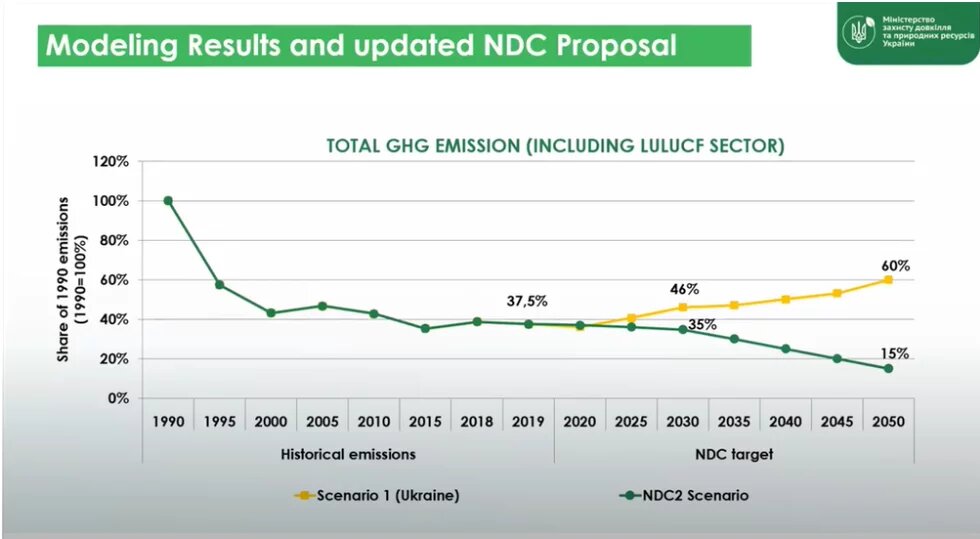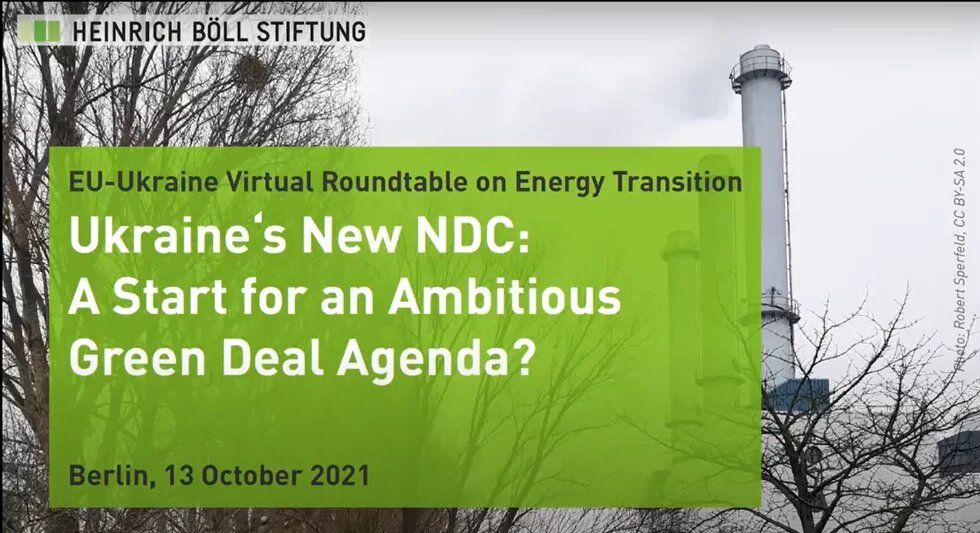
Summary of the 4th EU-Ukrainian Virtual Roundtable on Energy Transition organized by Heinrich Boell Foundation with its regional office in Ukraine and devoted to updated climate goals of Ukraine.

Ahead of the Glasgow climate conference, the Ukrainian government approved the country’s new pledge for reducing carbon emissions to 35% of 1990 level until 2030. This goal was differently perceived by stakeholders from different sectors. When climate civil society welcomed this new target as the first one aiming to at least small decrease (by 6.5%) of greenhouse gas emissions compared to the current level, others representing business interests were unhappy and concerned by potential future policies, which should be elaborated towards NDC implementation.
Considering the lack of consensus among national stakeholders and the somewhat problematic record of enforcement of environmental legislation in Ukraine (for example, National Emissions Reduction Plan accepted in 2017 is 0% implemented by 2021 and is discussed to be postponed again), participants of the 4th EU-Ukrainian Virtual Roundtable on Energy Transition gathered to discuss a potential of European-Ukrainian cooperation on speeding–up the necessary transformations.
The full video is available here.
There are no doubts that decarbonisation gains more attention on the highest political level both in Ukraine and EU. Moreover, it is becoming obvious that the European Green Deal has induced the climate discourse in Ukraine in particular with the prospect of a Carbon border adjustment mechanism (CBAM) playing a leading role. Nevertheless, the reaction within Ukraine was balanced and productive. There were few high level working groups established including an Intergovernmental working group on climate change coordination under the EU Green Deal Initiative and Green Deal Focus Dialogue. Not ending up with the discussion only, the updated National Determined Contribution under the Paris Agreement was adopted with the aim to reshape local policies towards decarbonisation. Ms. Iryna Stavchuk, deputy minister of ecology and natural resources of Ukraine has presented the new national climate goal of Ukraine.
“The goal to reduce emissions by 65% by 2030 out of 1990 level will allow to achieve drop by 6.5% compared to 2019, and what is more important – by 37% compared to Business as usual scenario modelling in 2030. If no climate policies applied, the significant emissions growth is possible in Ukraine. To implement NDC the Ministry is already working on integration of climate policy into sectoral ones similarly as it is foreseen in EU’s fit for 55 package”.
Iryna also mentioned that to step on the NDC implementation path it is necessary to conduct work on three tracks:
- To develop an action plan for NDC. For this purpose, the Ministry is analyzing what actions have been already included into other sectoral plans, and what is lacking for NDC prescribed transformations to happen.
- Reform of environmental finance.
- Development of the climate governance architecture.
The EU authorities support this approach. Mr. Marcus Lippold, Team leader on Energy and Green Deal of the EU Support Group for Ukraine also has stressed on the necessity of a climate dialogue continuation at both high political and sectoral level to translate the climate neutrality long-term 2050 goal into an operable 2030 target. He also has admitted that the European Green Deal has not been launched from the scratch in the EU, there were many legislative pieces preceding it. The approach taken to prepare Ukrainian NDC is more or less similar, as current policies in the energy, transport, agriculture and other sector were used to model emissions in 2030. Although it is worth mentioning that the level of enforcement of environmental legislation in Ukraine and EU differs significantly. Thus, in his statement Mr. Lippold emphasized on the priority of the NDC implementation.
“For this purpose it is important to support a dialogue and create a financial platform which will engage international financial organisations and donors. We also follow environmental legislation reform in Ukraine being a necessary enabling step for reaching necessary transformations in the context of the Green Deal. There are few laws stuck in the Ukrainian Parliament: on wastes, industrial emissions, environmental control.”
Along with the EU officials, Ukrainian civil society organisations also attentively follow the recent climate policy elaborations in Ukraine and welcome the NDC approval as well as the process how it was developed, acknowledging big impact of EU and European Green Deal, European Energy Community and civil society being facilitators of the NDC ambition. Ms. Anna Ackermann who is Energy Policy Analyst in Center for Environmental Initiatives "Ecoaction" (Ukrainian NGO) presented their assessment of NDC from perspective of what could be improved and done next.
“We should remember that the goal is to keep global warming at a relatively safe level. Ukraine’s NDC is unfortunately still not ambitious enough to keep global warming at 1.5C degrees. Analysis by Climate Action Tracker shows that Ukraine’s fair share should be cutting emissions by more than 1/3 from the current level. But of course Ukraine’s national circumstances do play a major role in what Ukraine could realistically achieve.
Unlike in the EU, climate policy is not yet an overarching one for Ukrainian decision-makers and society. There is no understanding of the pathway toward net-zero or concrete plans of how the energy transition and transformation of the economy should happen. The NDC itself also leaves some sectors largely free from the need to decarbonise in the nearest future.”
Another important difference between EU and Ukrainian climate action is the issue of public support. The population in Ukraine is concerned much more about other environmental issues such aswater and air pollution, illegal forest logging and poor waste management. These are the top issues that worry people most - not climate change. However, the demand for climate action remains much lower than in the EU, and that transforms into the lack of need to respond by authorities on different levels.
On the other hand, if there would be enough resources to tackle all environmental and climate issues at once, then climate skepticism among the population would not play such an important role. Financing is important and thus the Ministry of Ecology and Natural Resources of Ukraine is developing an NDC implementation financial strategy to be presented in early 2022.
Mr. Rouven Stubbe, Energy Economics Analyst at Berlin Economics believes that adequate price on carbon emissions is at the centerpiece of effective and efficient climate policy in general as well-known incentive against carbon emissions. And even this instrument will not be a golden bullet without further steps, presented by Mr. Stubbe:
“Two blocks of additional measures may be required. The first one is improving regulation and functioning of markets (particularly for electricity). Some markets are badly regulated, have many public companies and/or large private companies that capture the market. Also, increasing regulatory certainty for investors to be able to recover their investments in low-carbon projects is desirable.
The second block is the targeted investment support for low-carbon investments. Approximately 4 bln € of additional investments annually is required to implement the NDC - what is a lot. By far the largest part of the investment needs to come from the private sector. However, imperfect capital markets (limited access to credit, short repayment periods) justify an active role of the state to support private investments where needed. Ideally in the form of a National Climate Fund.”
The idea of the Climate Fund was supported by the Ministry of Ecology and Natural Resources of Ukraine, EU and civil society representatives by conditions of a good governance and proper resource redistribution policy (i.e., targeting at projects that are threatened to fail due to the higher cost of capital in Ukraine but are profitable if market reforms are in place).
In conclusion the discussants admitted that EU and partner countries like Germany have played already a major role in shaping progress of Ukrainian climate policy and it is worth to continue this cooperation in areas of political and analytical support to regulatory reforms as well as carbon pricing and the establishment and further co-financing of the Climate Fund. Such cooperation should allow climate goals to become overarching and mainstreamed in sectoral policies in Ukraine like they are under the European Green Deal. Ukraine should become a test case for a consistent approach to elaborate the external dimension of the Green Deal towards making Europe a climate neutral continent.